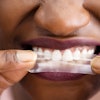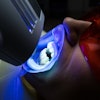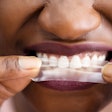Chronic pain sufferers who learn to dwell less on their ailments may sleep better and experience less day-to-day pain, according to results of research, published online in the journal Pain, conducted on 214 people with chronic face and jaw pain.
The researchers from Johns Hopkins University School of Medicine recruited 214 people with myofascial temporomandibular disorder (TMD). The participants were mostly white and female, with an average age of 34 years. Each participant underwent a dental exam to confirm TMD, then filled out questionnaires assessing sleep quality, depression, pain levels, and emotional responses to pain (Pain, March 12, 2012).
Researchers found a direct correlation between negative thinking about pain and poor sleep, which in turn appears to lead to increased pain for the TMD patients.
"We have found that people who ruminate about their pain and have more negative thoughts about their pain don't sleep as well, and the result is they feel more pain," said lead researcher Luis Buenaver, PhD, assistant professor of psychiatry and behavioral sciences at the Johns Hopkins University School of Medicine.
"If cognitive behavioral therapy can help people change the way they think about their pain, they might end that vicious cycle and feel better without sleeping pills or pain medicine."



















